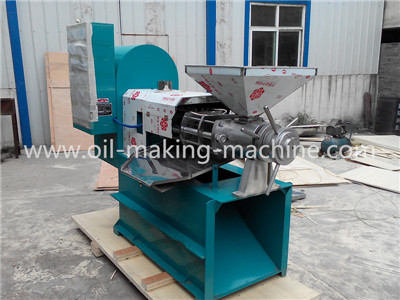
Author:Jintai网络部 Modified date:2024-7-18 16:39:45

The global demand for high-quality edible oils continues to rise, propelling the need for efficient and advanced oil processing technologies. Vietnam, a country with a rich agricultural heritage, has been at the forefront of this revolution, particularly in the realm of civilian edible oil production. With the introduction of high-quality cotton seed peanut oil press machines, the nation's edible oil processing sector is poised to enter the fast lane towards greater efficiency, productivity, and sustainability.
The pivotal role of these state-of-the-art machines cannot be understated. They are specifically designed to handle a wide range of oil-bearing materials, including but not limited to cotton seeds and peanuts. The technology embedded within these presses ensures maximum oil extraction rates while preserving the quality of the oil. This is achieved through precise temperature control, adjustable pressure settings, and automated systems that minimize human error and maximize output.
One of the most significant advantages of these machines is their adaptability. They can be seamlessly integrated into existing processing facilities or serve as the cornerstone of new ventures. For Vietnam, where small and medium-scale enterprises dominate the edible oil landscape, this flexibility is crucial. It allows for scalable operations that can grow alongside market demands without necessitating massive initial investments or subsequent upgrades that would break the bank.
From an environmental standpoint, these high-quality cotton seed peanut oil press machines also tick the right boxes. They are designed with energy-efficient components and processes that reduce power consumption and operational costs. In an age where sustainability is becoming increasingly important, such features not only lower the carbon footprint of edible oil production but also make the product more attractive to environmentally conscious consumers.
The impact on the local economy is profound. By embracing these technological marvels, Vietnamese oil processors can increase their yield per cycle, leading to higher volumes of oil being available for both domestic consumption and export. This boost in production can stimulate employment opportunities across the supply chain, from farming to distribution. Furthermore, as the quality of the oil improves, so does its market value, enabling producers to command better prices and improve their profit margins.

It is essential to consider the broader effect on the global market. As Vietnam becomes more competitive in the edible oil sector, it can carve out a larger share of the international trade. This increased presence on the world stage brings with it the potential for greater diplomatic leverage and economic cooperation with trading partners. The knock-on effect could see Vietnamese influence expand beyond commodities and into other sectors, enhancing the nation's position on the global stage.
However, the success of integrating these machines into the Vietnamese civilian edible oil processing sector is not guaranteed without deliberate strategies and policies in place. Government support in the form of subsidies, tax incentives, and training programs can play a vital role in encouraging adoption. Education about the benefits of these technologies compared to traditional methods will also be key in persuading those who may be wary of change.
Another crucial factor is the establishment of rigorous quality control standards. While these machines are capable of producing high-quality oil, consistent product excellence must be ensured through proper regulation and oversight. This will not only safeguard consumers against substandard products but also build trust in Vietnamese edible oils among international buyers.
In conclusion, the integration of high-quality cotton seed peanut oil press machines into Vietnam's civilian edible oil processing industry presents a myriad of opportunities. From enhancing production efficiency to improving the environmental footprint and fostering economic growth, these machines are catalysts for development. Nonetheless, for Vietnam to fully harness this potential, concerted efforts from all stakeholders—government, industry, and consumers alike—are required. Embracing innovation and progressing hand in hand with it can pave the way for Vietnam to not just keep pace but lead in the global edible oil market.
Prev :
The high-speed lane of chinese oilseed processing boosted by advanced rapeseed oil press machines
Next :
Laos's rapeseed cultivation and the market demand for rapeseed oil press machines